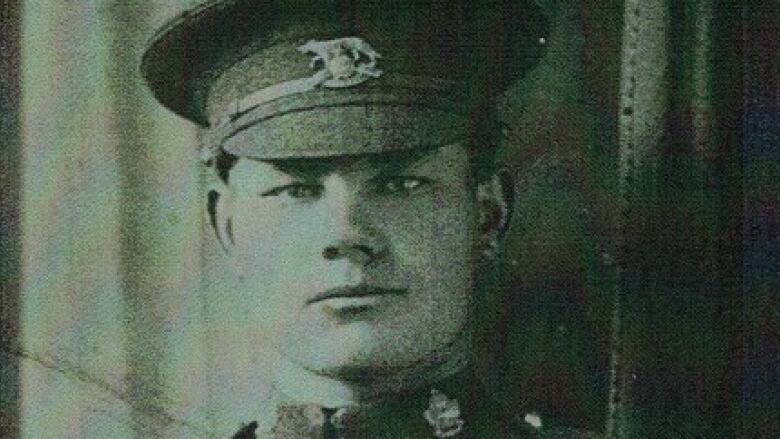Remains of WW I soldier from Manitoba found at construction site in France
Soldier died in early days of Battle of Hill 70 at the age of 22

The remains of a Manitoba soldiermissing in action since the First World War have been found at a construction site in northernFrance.
The bones of Pte. Reginald JosephWinfieldJohnston were discovered during a munitions clearing process at a construction site in thevillage of Vendin-le-Vieil, according to the Department of National Defence.
Local police in the northern village in Francewere notified, who in turned contactedthe Commonwealth War Graves Commission. The identity was confirmed through DNA testing of a Manitoba relative.
"It's all pretty mind-boggling after 100 years," said LorraineLeniuk, the great niece of Pte. Johnston. "Who would have ever thought this would all come about?It's hard to believe actually."
The remains were discovered in the summer of 2011 at the Vendin-le-Vieil construction site. Among the artifacts unearthed at the site was a button from the Canadian Expeditionary Force's 16th Battalion.
The button was a key cluefor Sarah Lockyer, aforensic anthropologist with the federaldefence department'scasualty identificationprogram in Ottawa, who flew to France to examine the remains.
"We knew there were 39 missing soldiers from the16thBatallionso that was our starting list, " saidLockyer.
'My gift from him'
Lockyer laid out the remains anatomically to figure out a biological profile, including age, sex, height and possible illnesses. Based on all that, she was able to narrow down the possibilities.
"We can get a very clearpictureand we can use that to create a list of potential candidates of who they were,"saidLockyer.
She needed a DNA test to confirm the identification. In August of 2016, the forensic anthropologist tracked down LorraineLeniukand asked her to provide a swab from her mouth.
A few days before Christmas, Lockyer called Leniuk with the good news.
"It was so special. It was like he was giving me this gift. I got the call and the letter on Dec. 21. That was my gift from him," said Leniuk.
Leniuksays apart of her always wanted to know more about the young man fromFairford,Man., who was reported missing in action and presumed dead at the age of 22 after the 1917 Battle of Hill 70.
Leniuk, who lives in a village north ofPetersfield, Man.,remembers a picture of her great uncle hanging on her grandmother's wall. Shealways wondered who the man was and how theywererelated.
As an adult, Leniukjoined a veterans club in Selkirk and started to ask questions. Then she travelled to the VimyMemorial where his name is inscribed on the monument alongside thousands of other Canadian soldiers missing and presumed dead in France.
Pte. Johnstonwas born in Springfield, a community east of Winnipeg, but his family later moved north to Fairford, Man.
He was a homesteader until he enlistedin1916 at the age of 20. Johnston was killed at the age of 22in the Battle of Hill 70 on Aug. 15 or 16of 1917.
The Battle of Hill 70,which took place Aug. 15 to 25,1917, was the first major action fought by the Canadian troops under a Canadian commander in the First World War.About 2,100 Canadians lost their lives in the battle. Over 1,300 have no known graves. The strategic high point of Hill 70 remained in Allied hands until the end of the war.
Leniuk and another relative plan totravel to France this summer so they can be present when Johnston's remains are laid to rest. He will be buriedat Loos British Cemetary outside Loos-en-Gohelle, France by his regiment.
"He will be buried with full honours and dignity. I am happy I will be able to go and pay my respects," said Leniuk. "I will thank him for my freedom and his sacrifice."












_(720p).jpg)


 OFFICIAL HD MUSIC VIDEO.jpg)
.jpg)



























































































